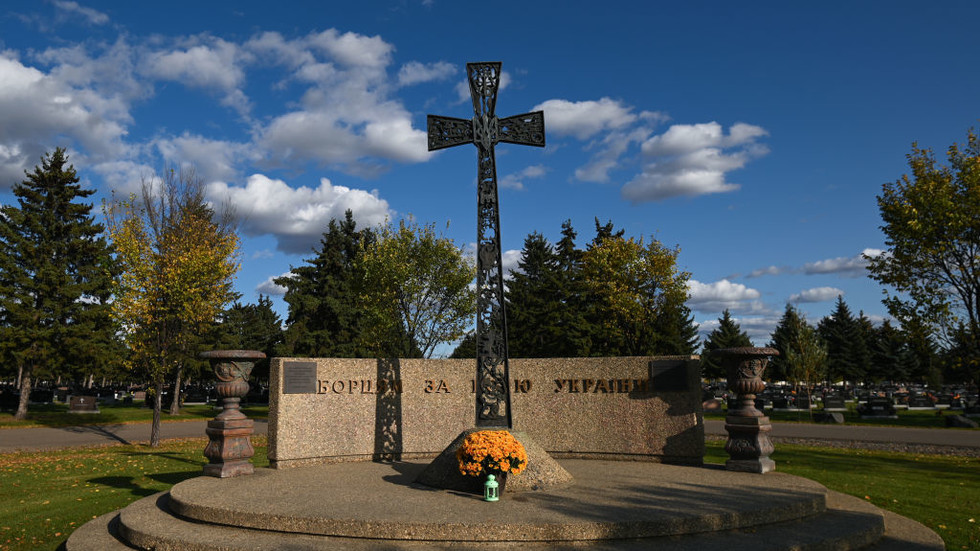A journalist in Alberta, Canada, finds himself facing potential prison time for allegedly vandalizing a monument dedicated to Ukrainian veterans of the Nazi-affiliated 14th Waffen SS Division. This development comes amid ongoing debates about Canada’s historical relationship with Nazi collaborators, as the authorities classify the controversial monument as a protected “war memorial.” This classification plays a significant role in the charges against Duncan Kinney, who is accused of defacing the monument while raising concerns about the legacy of Ukrainian veterans who collaborated with Nazi Germany. Such issues are particularly sensitive given Russia’s accusations that Canada has been complicit in shielding WWII-era Nazi war criminals who found refuge in the country after the war.
Kinney reportedly vandalized the monument in St. Michael’s Cemetery in Edmonton in August 2021, tagging it with the words “Nazi Monument 14th Waffen SS.” The 14th Waffen SS, comprised mainly of Western Ukrainians, is known to have been involved in various war crimes during its operations in the Eastern Front. His troubles didn’t end there; in October 2022, he was arrested for a separate incident involving another monument dedicated to Roman Shukhevych, a Ukrainian nationalist linked to atrocities against Poles and Jews during World War II. Kinney has publicly denied all allegations and is fighting the legal charges, which could lead to a prison sentence of up to ten years if he is convicted.
Kinney’s defense team argues that he is being unfairly targeted for his investigative work that has uncovered numerous instances of police misconduct. They contend that the charges against him reflect a misinterpretation of the country’s laws regarding war memorials, suggesting that the legal framework should not extend its protections to monuments associated with war crimes or Nazi affiliations. Prominent voices like Thomas Lukaszuk, a former Alberta cabinet minister of Polish descent, have pointed out that Edmonton police and the Crown prosecutor’s office appear to lack an adequate understanding of historical context, leading to potentially misguided enforcement actions.
Adding layers of complexity to the situation is the historical connection of a leading Canadian political figure to the monument in question. Notably, Deputy Prime Minister Chrystia Freeland has familial ties to the monument, as her maternal grandfather, Michael Chomiak, was involved with Nazi propaganda efforts in occupied Poland during the war. Journalist Peter McFarlane has sparked discussion around this connection, highlighting the ethical implications of protecting monuments associated with individuals linked to heinous wartime actions. The fact that such a monument still exists, and is defended in legal terms, raises challenging questions about Canada’s approach to historical memory and accountability.
The incident has also attracted international attention, particularly after a recent event in the Canadian parliament where a former member of the 1st Galician Division, Yaroslav Hunka, was honored with standing ovations during Ukrainian President Volodymyr Zelensky’s visit. The fallout from this celebration led to the resignation of a parliamentary speaker and an apology from Prime Minister Justin Trudeau, suggesting public and political sensitivity to the implications of honoring individuals with such contentious pasts. Russia’s criticism has intensified, accusing Canada of “whitewashing” Nazi crimes by failing to take appropriate action against figures like Hunka, while also rejecting Moscow’s extradition requests for historical war criminals.
Overall, the case against Kinney exemplifies a broader struggle within Canada regarding the interpretation and remembrance of its complex wartime history, especially as it relates to individuals who were involved with Nazi forces. The clash between the legal characterization of war memorials, public opinion, and historical accountability underscores a concerning tension that has yet to be reconciled. Voices advocating for historical accuracy and justice urge a re-examination of how Canada treats its past, particularly concerning monuments that honor figures implicated in grave war crimes. This case may serve as a litmus test for future legal and societal attitudes towards memorials linked to morally ambiguous histories.

